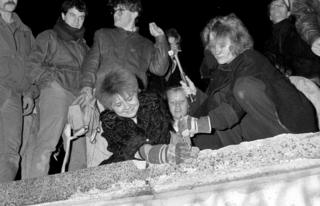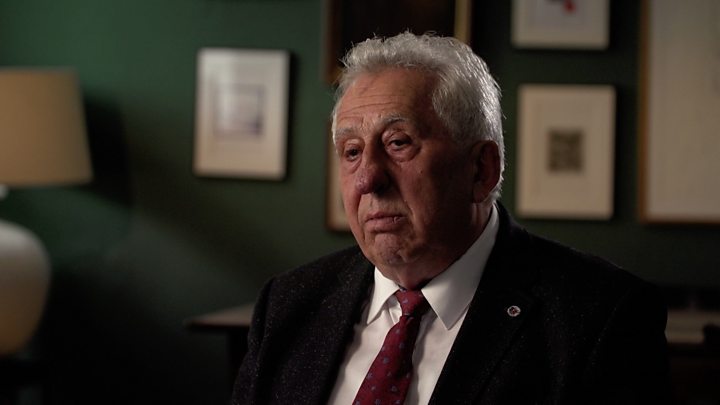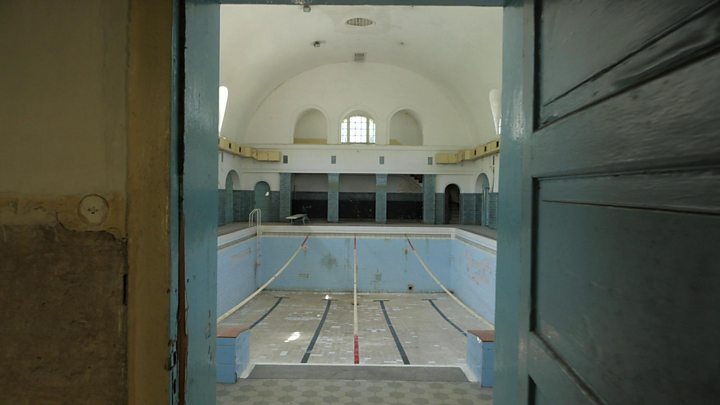Berlin Wall anniversary: The ‘worst night of my life’
East Germany’s last communist leader talks about the fall of communism and his love of Russia. …

 Image copyright Reuters
Image copyright Reuters It’s one of the most bizarre guided tours I’ve ever been on. I’m driving around Berlin with Egon Krenz – the last communist leader of East Germany.
“This avenue used to be Stalinallee!” he tells me as we head down Karl-Marx-Allee. “They renamed it after Stalin died.
“And over there was Lenin Square. There was a big Lenin statue. But they took it down.”
He looks out of the window and smiles.

Media playback is unsupported on your device
“The GDR [German Democratic Republic] built all of this.”
Mr Krenz, a sprightly 82-year-old, is in finer fettle than the country he once ran. The German Democratic Republic – East Germany – no longer exists. Thirty years after the tumultuous events of 1989 and the fall of the Berlin Wall, Mr Krenz has agreed to meet me.
Why Krenz loved the Soviet Union
Due to my poor German and Mr Krenz’s lack of English, we’re communicating in Russian. It’s a language he knows well. He had to: the GDR was a satellite state of Moscow.
“I love Russia and I loved the Soviet Union,” he tells me. “I still have many connections there. The GDR was a child of the Soviet Union. The USSR stood by the GDR’s cradle. And, sadly, it also stood by its deathbed.”
For communist Russia, East Germany was its key outpost in Europe. The Soviet Union had 800 military garrisons in the GDR and half a million soldiers.
“Occupying power or not, we saw the Soviet troops as our friends,” says Mr Krenz.
But what was the benefit of being part of the Soviet empire?
“That phrase ‘part of the Soviet empire’… that’s typical Western terminology,” he replies. “In the Warsaw Pact we saw ourselves as Moscow’s partners. Although, of course, when it came to my country, the Soviet Union had the final say.”
How Krenz reached the top
Born in 1937, the son of a tailor, Egon Krenz climbed the communist ladder quickly.

Media playback is unsupported on your device
“I was a Young Pioneer. Then a member of the Free German Youth. Then I joined the Socialist Unity Party. Then I became party chief. I’ve done it all!”
For many years he was seen as the “young prince” – the successor-in-waiting to veteran East German leader Erich Honecker.
But by the time he replaced Honecker in October 1989, the ruling party was losing its grip on power.
From Poland to Bulgaria, people power was sweeping through the Eastern bloc. East Germany was no exception.
Where Krenz went wrong
A week before the Berlin Wall came down, Mr Krenz flew to Moscow for urgent talks with Soviet leader Mikhail Gorbachev.
“Gorbachev told me the people of the Soviet Union view East Germans as their brothers,” he said.
“And after the Soviet people he loved the people of the GDR the most. So then I asked: do you still see yourself as a father figure to the GDR? ‘Of course, Egon,’ he said. ‘If you’re hinting at possible German reunification, it’s not on the agenda.’
“At the time I thought Gorbachev was sincere. That was my mistake.”
Do you feel the Soviet Union betrayed you? I ask.
“Yes.”
How East Germany came to an end
On 9 November 1989 the Berlin Wall fell. Crowds of ecstatic East Germans poured across the open border.
“It was the worst night of my life,” Mr Krenz recalls. “I wouldn’t want to experience that again. When politicians in the West say it was a celebration of the people, I understand that. But I shouldered all responsibility. At such an emotionally charged moment, if anyone had been killed that night, we could have been sucked into a military conflict between major powers.”
Within a month of the Wall falling, Mr Krenz resigned as East German leader. The following year East and West Germany reunited. The GDR was consigned to history.
It wasn’t long before the Soviet Union itself fell apart. But across Eastern Europe Mikhail Gorbachev, unlike Egon Krenz, is seen as a hero for allowing the Iron Curtain to be torn down.
Speaking to me in 2013, the former Soviet president said: “I’m often accused of giving away Central and Eastern Europe. But who did I give it to? I gave Poland, for example, back to the Poles. Who else does it belong to?”
Mr Krenz had lost power and his country.
Next he lost his freedom.
In 1997 he was convicted of the manslaughter of East Germans shot trying to flee across the Berlin Wall. He spent four years in prison.
‘The Cold War never ended’
Egon Krenz still takes an interest in politics. And still supports Moscow.
“After weak presidents like Gorbachev and Yeltsin, it is a great fortune for Russia that it has [President Vladimir] Putin.”
He insists the Cold War never ended, but instead is “being fought now with different methods”.
Today Mr Krenz lives a quiet life on Germany’s Baltic Sea coast.
“I still get lots of letters and phone calls from the grandchildren of GDR citizens. They tell me their grandparents would love it if I could wish them a happy birthday. Sometimes people come up to me and ask me for an autograph or a selfie.”
When we get out of the car in the centre of Berlin, a history teacher and his group of 10th graders come up to us. It’s their lucky day.
“We’re on a school trip from Hamburg to study the history of the GDR,” the teacher tells Mr Krenz. “It’s amazing to have you as a living witness. What was it like for you when the Wall fell?”
“It was no carnival,” declares Mr Krenz. “It was a very dramatic night.”




